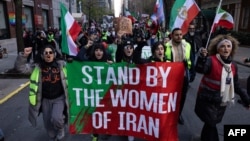Iran’s violent repression of peaceful protests and widespread, systematic violations of human rights could, in many cases, amount to crimes against humanity, according to a U.N. fact-finding mission.
The three-member team on the Independent International Fact-Finding Mission on Iran, in its first report to the U.N. Human Rights Council, accuses the Iranian government of a litany of crimes in connection with the protests that erupted following the death in custody of Mahsa Amini on September 16, 2022.
The mission, which was established two months later to investigate the crackdown on the protests, accuses Iranian authorities of “egregious human rights violations.”
They include unlawful deaths, extra-judicial executions, arbitrary arrests, rape, sexual violence, and enforced disappearances.
The chair of the mission, Bangladeshi lawyer Sara Hossain, who also presented the report, said these acts were conducted in the context of a “widespread and systematic attack against women and girls,” and others expressing support for human rights.
“Some of these serious violations of human rights thus rose to the level of crimes against humanity, including murder, torture, rape, and gender persecution, intersecting with ethnicity and religion,” she said.
Regarding 22-year-old Amini, whose death in custody of the so-called morality police sparked the nationwide protests, Hossain said “Our investigation established that her death was unlawful and caused by physical violence in the custody of the state authorities.”
The mission found that the use of disproportionate force on peaceful protests, including firearms and assault rifles by Iran’s security forces resulted in 551 deaths “among them at least 49 women and 68 children.”
Hossain said security forces carried out mass arbitrary arrests of protesters, many of whom were sent to unofficial detention facilities run by the Ministry of Intelligence and the Revolutionary Guards.
She said witnesses have described conditions under which detainees were held as inhumane, with many subjected to prolonged solitary confinement, and deprived of any contact with families and lawyers.
“To punish, humiliate or extract a confession from them, detainees were often subjected to sexual and gender-based violence, including gang rape and rape with an object, as well as beatings, flogging, or electric shocks in acts that constitute torture,” she said, adding that children also were subjected “to extrajudicial killings, torture, rape and held in detention along with adults.”
Hossain added that at least nine young men were arbitrarily executed, following a flawed prosecution “creating terror among other protesters.” By January this year, she said at least 26 other death sentences were pronounced by Iranian courts.
Iran dismisses report as ‘charade’
Kazem Gharib Abadi, secretary-general of Iran’s High Council for Human Rights, was scathing in his response to the report of the “so-called fact-finding mission,” which was formed “owing to the lobbying as well as political wheeling and dealing of certain countries,” principally the United States, Germany, England, France, and Canada.
He said the mission’s report “has been marred by a glaring lack of independence and impartiality.” Calling it a “political charade,” he said the report omits all reference to his government’s investigation of the protests.
He said the events in Iran last year “did not constitute peaceful gatherings, but rather evolved into orchestrated riots characterized by extensive injuries to law enforcement personnel and substantial damage to both private and public property.”
A complementary report submitted to the U.N. council by Javaid Rehman, special rapporteur on the situation of human rights in Iran, paints a chilling picture of a repressive regime that rules its people by coercion and fear.
“I remain very concerned at the on-going executions and spike in death penalty sentences,” said Rehman. “At least 834 people were executed in 2023, a 43 percent increase compared to 2022.”
Rehman noted more than half of these executions were for drug-related charges. He said children continue to be executed in Iran, with at least one child execution reported last year.
Additionally, at least 22 women were executed in 2023, making this “one of the highest rates of women executions recorded in the country.”
He expressed deep concern about the disproportionately high number of ethnic and religious minorities executed by the government for drug or security-related crimes.
In his report, Rehman documents cases of arbitrary arrests and allegations of torture and ill-treatment in detention. He describes the government’s suppression of freedom of expression and peaceful assembly and efforts to stifle opposition voices through “the harassment, intimidation, targeting, arrests and imprisonment of human rights defenders, lawyers, journalists, and trade union activists.”
Rehman condemned the government’s continued disdain of women’s rights, noting that authorities have “with complete impunity, unlawfully killed at least 48 women and 68 children and injured, violated, and brutalized a very large number of women and girls during the ‘Women, Life, Freedom’ movement.”
He said he has received “extremely concerning reports that rape, torture, and other forms of sexual violence were weaponized in order to inflict punishment on these peaceful protesters.”
Iran’s human rights counselor at its permanent mission in Geneva, Somayyeh Karimdoust lambasted the rapporteur’s report as “fabricated and distorted.”
She said the report is not factual, nor is it professional, “let alone being reasonably fair and fairly balanced and reflective of Iran’s constant progress in promotion and protection of human rights… It is absolutely one-sided and misleading.”
The mandates of both the fact-finding mission and that of the rapporteur on human rights in Iran come up for renewal at this Council session.
Karimdoust was clear about where she stood on this matter.
“A monitoring mechanism on Iran’s human rights is unwarranted and lacks legitimate ground, is not fair and is not justified,” she said.









